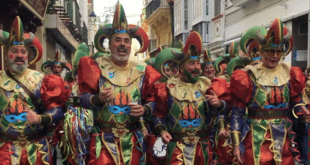Locals will be aware if you break an unspoken rule. Credit: Canva
You came for sun, tapas and sangria. It’s possible that a local will give you a side eye and feel like you’ve broken something. It’s not a rule, and even worse, it’s an unspoken one. Spain is warm and welcoming, but like any culture that has a complex and long history, there are also its own rhythms. There are no rules that you can find anywhere. However, if they are broken, it will make you stand out as someone who is eating dinner at six in the evening. Decode the Spanish etiquette which makes Spain tick and tourists go crazy.
1. Request the bill politely and repeatedly
In Spain you do not rush and you are also not served unless you ask for it. You can also find out more about us on our website. Make it clear that you’re ready. The waiter does not ignore you but is giving you some space with a respectable, apathetic attitude. You can channel your inner Flamenco dancer to get a menu or a drink. Maintain eye contact and raise your hand with control. Say disculpe or la cuenta, por favor. If, after trying all of this, they don’t come, politely try again, repeatedly. This is not rudeness, but survival.
2. Tipping can be optional
In Spain tipping is a bit like having a second vermouth glass; it’s nice, but unexpected. The waiters in Spain are paid a minimum wage. If you received good service, tip a little more. Avoid tourist attractions that use smiley faces on their receipts to encourage people to give 10% extra. You’ve entered a tourist scam if your receipt guilt-trips into generosity. You can tip with a card. Simply say “Hazlo riodondo” to round it off.
3. No frills service
Spain can seem harsh if you’re used a chirpy staff and compliments for your current attire. Here’s the thing: The waiter isn’t mean. He is simply busy. The food is hot, the napkins are there, and the Spaniards do not need to be asked “how does everything taste?” every five minutes. They want Napolitana Caliente as soon as possible. It’s okay to skip the pleasantries, but please don’t, because they slow the line.
4. It’s the new normal to be late
Spain does not mind what your watch says. Want lunch? Wait until 2 p.m. Dinner? You can’t shop before 9 p.m. They are open late, close at midday and reopen later. Mondays? The graveyard of closed shutters. At 6 p.m., you’re still trying to eat your dinner? The kitchen is not open yet, as it is teatime. Google Maps does not serve food when it says “open 24 hours”; they mean the location is open. Call ahead or risk going hungry.
5. Transport etiquette
In Spain, you should stand on your right when using the escalator. The left is for the fast lane. Allow people to exit the metro before boarding, and only use the lift when you have a child, luggage or an injury. You can become the villain of someone else’s commute if you take the lift for fun. If you can walk, do so. The taxis in old town will be slower and less reliable. It’s true, not everything needs to be Ubered.
6. Drink like a local
In Spain, it is perfectly acceptable to drink alcohol at 11 am. No one will object or make you feel guilty. In Barcelona, it’s almost a game to pair your cava and your breakfast chorizo. Just remember that this is not a shot-culture, but a sipping one. The Spaniards are known to drink slowly and not stumble. They also converse. In increasing numbers, they choose cerveza without alcohol. Spain is the world’s leader in beer consumption with zero alcohol. Want to blend in with the crowd? Order una cero cero. You won’t be able to nap all afternoon.
7. Toilet techniques
You may be able to find a public toilet in Spain, but it might not work. It could be worse. This is the best-kept secret. When nature calls, enter a bar. Order a small cup of coffee (uncortado), and use their facilities. You should not rush to the WC and sneak into a bar. This is bad for your karma, and it’s also bad manners.
8. Driving is wild
Are they also good drivers? They’re like chaos agents. They do not use indicators. Aroundabouts are like thunderdomes. At certain pedestrian crossings you’ll be expected to assess other peoples’ traffic signals from your car. Mario Kart meets responsibility. What is the best advice? Renting is not recommended unless you have a good sense of direction or want to add some mild stress to your life.
9. Airbnb neighbours who are not on holiday.
Spain is a social country, full of joy and noise, but it’s also very sensitive to noise. Buildings are made of thin walls and suitcases echo at midnight. Weekends are quiet hours, even though the siesta has faded. Respect this or you could risk waking up the abuela who is napping behind the wall. On another note, you should separate your recycling. Cities like Madrid have strict trash systems, and if you don’t put everything in one bag, the locals will be annoyed and may fines.
10. The national sport is staring.
This is subtle. Spaniards will hold their gaze on you longer than you are used to—a few seconds longer. It can happen on the street or the metro. Or even in the bakery line. It is not flirting nor threatening. Just is. You can nod, smile or look back. But do not stare back too long– that’s your culture, not theirs.
Spain isn’t perfect, but it’s about understanding the pace of life, and that there is room for good company, great food, and a long lunch every now-and-then. It is not necessary to be Spanish in order to understand these unspoken guidelines. They will help you enjoy Spain more with the Spanish than just around them. You can order cava in the morning, wait for the bill to arrive (expect delays), walk, instead of cabbing, and don’t expect a smile when tipping.
 Costa News Spain Breaking News | English News in Spain.
Costa News Spain Breaking News | English News in Spain.






